Intel Iris Pro 5200 Graphics Review: Core i7-4950HQ Tested
by Anand Lal Shimpi on June 1, 2013 10:01 AM EST3DMarks & GFXBenchmark
We don't use 3DMark to draw GPU performance conclusions but it does make for a great optimization target. Given what we've seen thus far, and Intel's relative inexperience in the performance GPU space, I wondered if Iris Pro might perform any differently here than in the games we tested.
It turns out, Iris Pro does incredibly well in all of the 3DMarks. Ranging from tying the GT 650M to outperforming it. Obviously none of this has any real world impact, but it is very interesting. Is Intel's performance here the result of all of these benchmarks being lighter on Intel's weaknesses, or is this an indication of what's possible with more driver optimization?
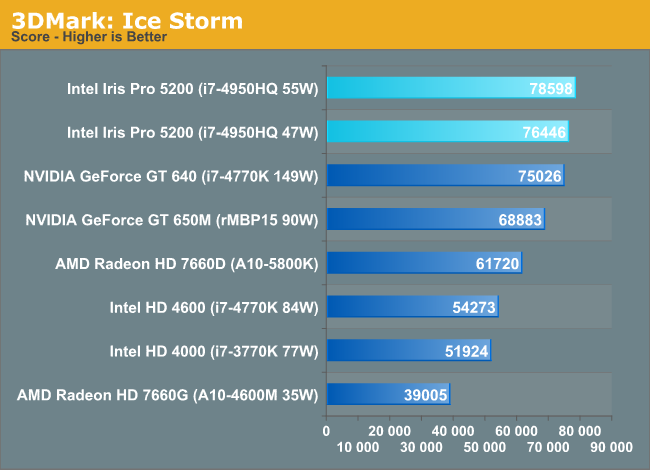
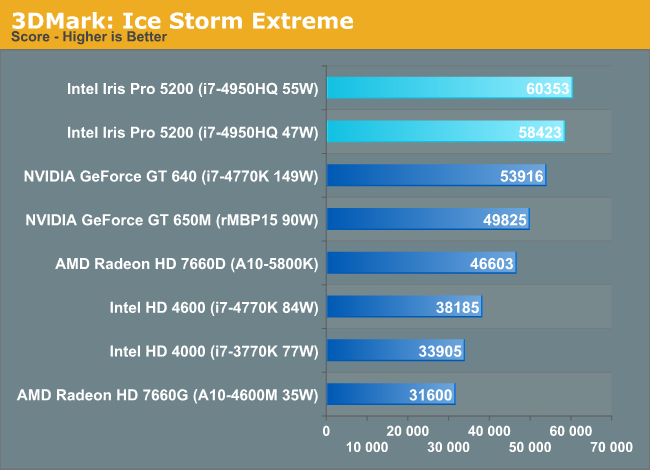
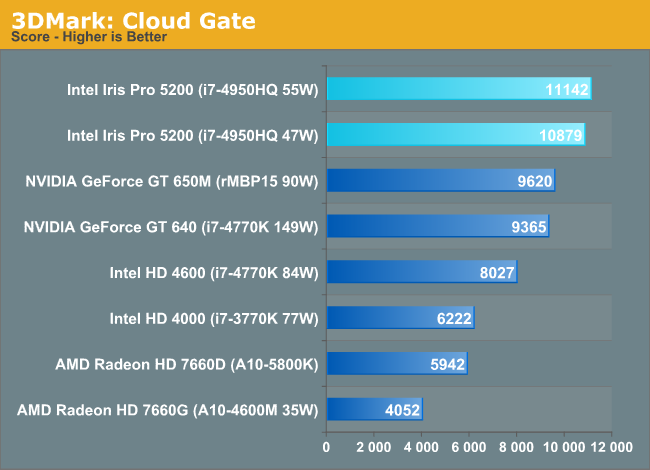
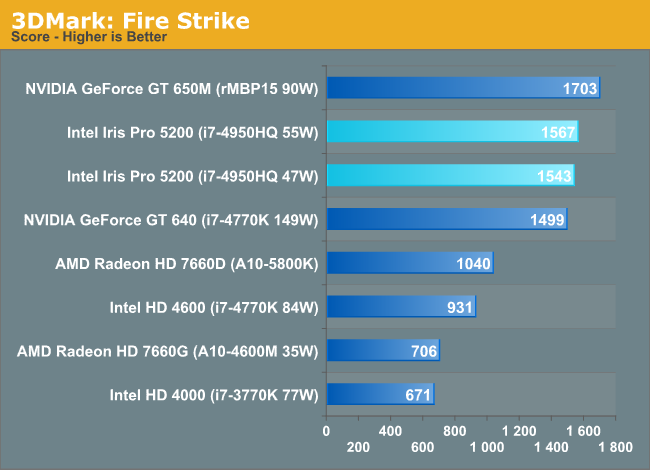
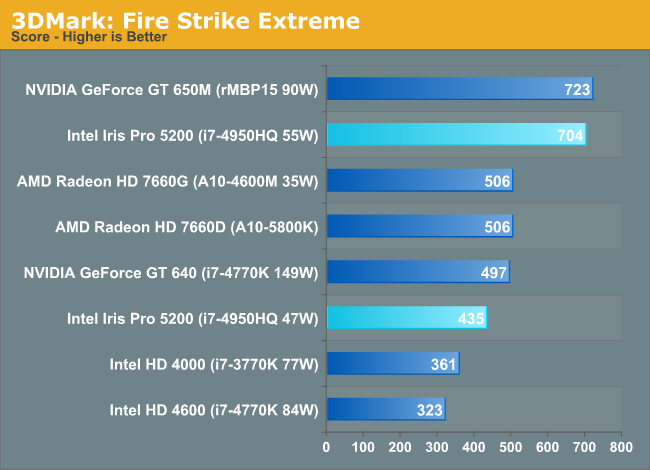
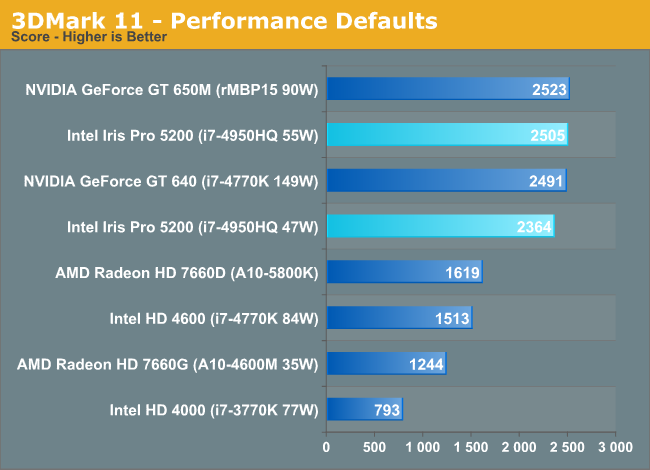
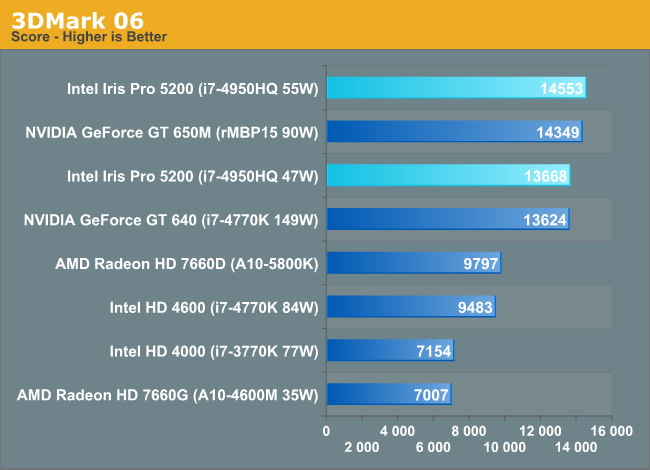
I also included GFXBenchmark 2.7 (formerly GL/DXBenchmark) as another datapoint for measuring the impact of MSAA on Iris Pro:
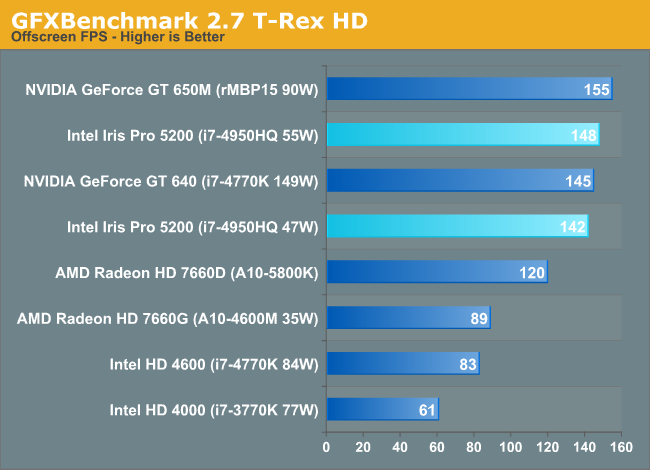
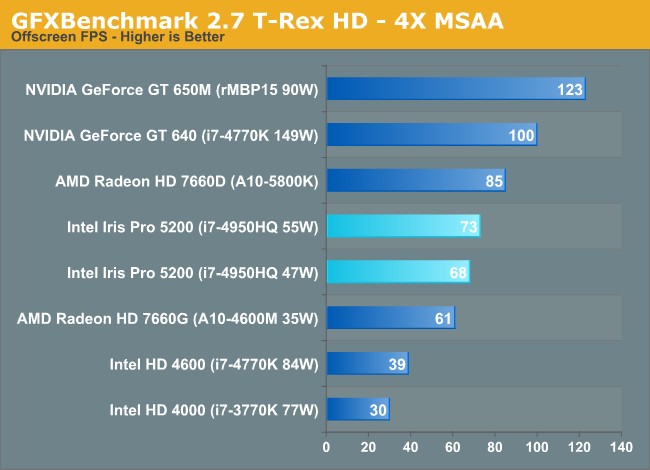
Iris Pro goes from performance competitive with the GT 650M to nearly half its speed once you enable 4X MSAA. Given the level of performance Iris Pro offers, I don't see many situations where AA will be enabled, but it's clear that this is a weak point of the microarchitecture.










177 Comments
View All Comments
kyuu - Saturday, June 1, 2013 - link
It's probably habit coming from eluding censoring.maba - Saturday, June 1, 2013 - link
To be fair, there is only one data point (GFXBenchmark 2.7 T-Rex HD - 4X MSAA) where the 47W cTDP configuration is more than 40% slower than the tested GT 650M (rMBP15 90W).Actually we have the following [min, max, avg, median] for 47W (55W):
games: 61%, 106%, 78%, 75% (62%, 112%, 82%, 76%)
synth.: 55%, 122%, 95%, 94% (59%, 131%, 102%, 100%)
compute: 85%, 514%, 205%, 153% (86%, 522%, 210%, 159%)
overall: 55%, 514%, 101%, 85% (59%, 522%, 106%, 92%)
So typically around 75% for games with a considerably lower TDP - not that bad.
I do not know whether Intel claimed equal or better performance given a specific TDP or not. With the given 47W (55W) compared to a 650M it would indeed be a false claim.
But my point is, that with at least ~60% performance and typically ~75% it is admittedly much closer than you stated.
whyso - Saturday, June 1, 2013 - link
Note your average 650m is clocked lower than the 650m reviewed here.lmcd - Saturday, June 1, 2013 - link
If I recall correctly, the rMBP 650m was clocked as high as or slightly higher than the 660m (which was really confusing at the time).JarredWalton - Sunday, June 2, 2013 - link
Correct. GT 650M by default is usually 835MHz + Boost, with 4GHz RAM. The GTX 660M is 875MHz + Boost with 4GHz RAM. So the rMBP15 is a best-case for GT 650M. However, it's not usually a ton faster than the regular GT 650M -- benchmarks for the UX51VZ are available here:http://www.anandtech.com/bench/Product/814
tipoo - Sunday, June 2, 2013 - link
I think any extra power just went to the rMBP scaling operations.DickGumshoe - Sunday, June 2, 2013 - link
Do you know if the scaling algorithms are handled by the CPU or the GPU on the rMBP?The big thing I am wondering is that if Apple releases a higher-end model with the MQ CPU's, would the HD 4600 be enough to eliminate the UI lag currently present on the rMBP's HD 4000?
If it's done on the GPU, then having the HQ CPU's might actually get *better* UI performance than the MQ CPU's for the rMPB.
lmcd - Sunday, June 2, 2013 - link
No, because these benchmarks would change the default resolution, which as I understand is something the panel would compensate for?Wait, aren't these typically done while the laptop screen is off and an external display is used?
whyso - Sunday, June 2, 2013 - link
You got this wrong. 650m is 735/1000 + boost to 850/1000. 660m is 835/1250 boost to 950/1250.jasonelmore - Sunday, June 2, 2013 - link
worst mistake intel made was that demo with DIRT when it was side by side with a 650m laptop. That set people's expectations. and it falls short in the reviews and people are dogging it. If they would have just kept quite people would be praising them up and down right now.